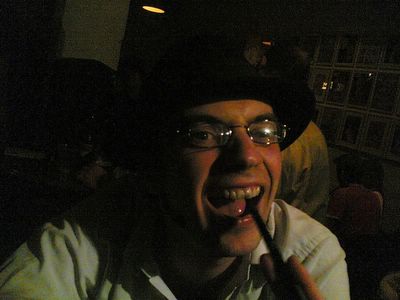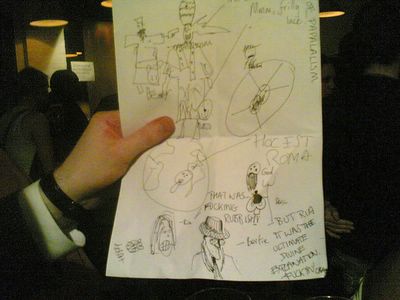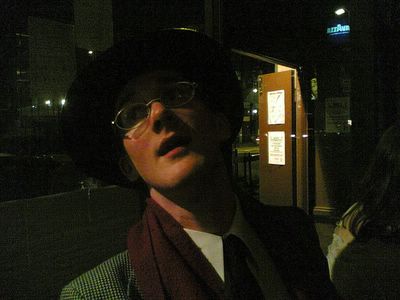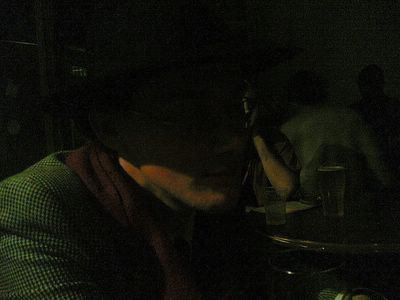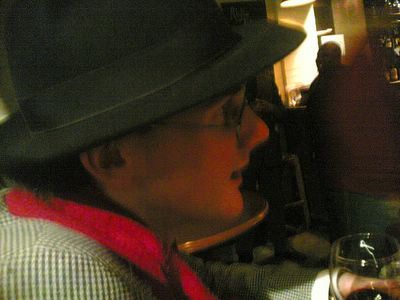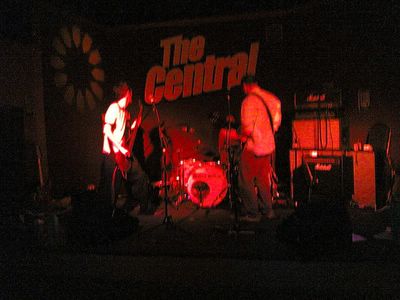normally, when i'm reading a couple of books at once or in quick sucession, i'll automatically notice similarities between them, and to me, they'll both end up being about largely the same thing. i can't help but see the unity between two texts, most of all with my long-term project godel escher bach, which seems to contain all human knowledge and rings with any book i'm concurrently reading. as you can expect, especially with things that you don't notice until they're gone, this recently was broken, and the man responsible? alan moore.
give him half a provocation, and the he'll rattle on about language; the power of language, and how language is magic (in fact, i can't believe peter jackson didn't get him to play gandalf). take this excerpt from judgement day (ta dan):
young glory: you're silly.
hermes: ah, but "silly" means wise or divinely touched. did you know that? you ought to be careful with words.
...
demeter: do not trust [hermes]. the god of mind and mirth and language is the deadliest god of all!
but do words have 'ultimate' meanings? the confrontation here comes from lewis carroll, via hoftstadter; surely words only mean what the person saying them wants them to mean? 'this language is your language', to misquote woodie guthrie. i've always naturally believed this, coming from a background where religious services are given in herbew - can't god understand english? or more likely, god doesn't even listen to the language, but feels the devotion behind it, like when one talks to a cat with a mixture of compliments and sweet noises - the compliments are there because one likes the cat, and expresses it in one's own language, and although the cat cannot understand the words, it understands the sentiment.
a short excursion into the world of insults.
i have often pondered about the usefullness of insulting someone; calling someone a cunt is only comical. why not just explain what they did wrong? (see previous post about being human) in this respect, one does need to be very careful with what word one chooses. 'cunt' is surely related to the french 'con' which translates better as 'arsehole', or maybe more abstractley, 'orifice'. to me, 'cunt' has no negative 'cunnatations' any more, and even with nathan barley, i understand his nickname as a reference to how someone else would use the term, in a blunt and p'haps misdirected way. we have to take something out of the recent history of the word, because cunt is still used as a slang for vagina, and not to harp on, but unless you're a gay man, what's wrong with that? tumour is a much better insult; something that works against the whole, and also something that no-one would want, but best of all, no-one is a tumour, so it is better than spac, or scoper. of course, you would not want to over-insult someone. if someone drops a plate on your toe, it would be wrong to call them a 'hitler', one would prefer 'klutz' or 'prat', but these only mean clumsy, they're less offensive because they only describe what the person is, fairly accurately. you knocked something out of a cupboard, so i'll call you a name that means clumsy. fair enough. slightly redundant, but most human communication is. this essay, for instance.
but moore always equates language with magic. my conception of magic is the same as how i talk to cats; i have always assumed that a focus word could be anything, as long as it worked it for you. i'd be surprised if this wasn't true, and so far, moore hasn't convinced me. i'm not dissing the power of words - i still believe they are inextricably linked to the concepts in our minds, and as such, do hold tremendous power. to anarchically fool around with them as carroll does is dangerous and nihilistic. but it is also as truthful as using them correctly. in moore's 'the courtyard' (spolier warning!), when the protag gets his dose of 'aklo', which turns out to not be a drug, but a language, he is given words such as 'wza-y'ei':
"a mental floor gives way beneath me. i realise i know what the word means; have known all along. wza-y'ei is a word for the negative conceptual space left surrounding a positive concept, the class of things larger than thought, being what thought excludes."the protag goes apparantly mad with this new knowledge, his mind unable to cope, but is that just how us mere mortals, with our unexpanded conciousnesses, view his actions? regardless, through this elegant and moving section, moore shoots himself in the foot: he made that word up. he could have put any series of letters there and the concept would have been the same. tangentally, this illustrates the platonic ideals that exist in our minds already, something else that both hofstadter and my AI studies have implicated; visually, we cannot help but see spheres, converging lines, squares askew and so forth. these things are in our head already, and i believe the same is true of fundamental concepts like love and fear, upon which more complex functions of thought are built, and clustered, and represented as words.
where moore succeeds in 'the courtyard' is in the teaching metaphor. when studying something new, it pays to accept the terms used by the people you're learning from; why would you want to confuse matters by having a different word for the same concept, or worse, a different concept for the same word? indeed, can any of us have any concepts that are the identicle to other people's? coincidentally, this is the chapter i am still reading in godel escher bach.
there is no conclusion.


